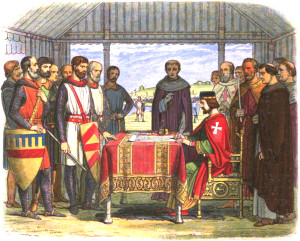The landmark document was reissued in 1216 under the regency of John’s son, King Henry III, and incorporated the next year in the First Barons’ War peace treaty, when it acquired its name. By 1297 it was confirmed as part of England’s statute law, legal principles that, in turn, influenced American and other governments’ documents down the years.
Eight hundred years after John signed it, Law Day commemorates the sealing of the Magna Carta, recognizing it as containing many of the fundamental principals of American — and all democratic — government.
Through its Open Government Commission and the City Attorney’s Office, Benicia will host community activities marking Law Day, which was initiated in 1957 by the American Bar Association to celebrate the rule of law. This year’s theme is “Magna Carta: Symbol of Freedom Under Law.”
Locally, residents — adults as well as children — can participate in an art contest City Attorney Heather McLaughlin has been promoting at the conclusion of her annual open government training of all members of Benicia’s boards, commissions and committees.
“Everyone is invited to create art that features the Magna Carta,” said Donna Ernst, legal technician in the City Attorney’s Office.
Elementary school students can get some help with their art: McLaughlin has made available “Color the Law Day” coloring pages in her office at City Hall, 250 East L St., and a downloadable form can be downloaded for printing from her Web page, www.ci.benicia.ca.us/cityattorney.
Middle school-age students may participate in Law Day by writing a one-page essay or poem on the subject, “How George Washington was defending the Magna Carta during the Revolutionary War.”
Those of high school age may write a one-page essay or poem on the topic, “How English liberties that originated in the Magna Carta are being preserved by the United States.”
Adults have their own Law Day literary contest, too: They may compose a poem or write in another format about the Magna Carta. All written and artistic creations must be in the City Attorney’s office by May 1.
Art will be judged by the Benicia Arts and Culture Commission, McLaughlin said. Essays will be judged by members of the Benicia Library Board, and poems will be judged by Don Peery, the city’s poet laureate.
Winners will be announced at the May 19 City Council meeting, and Benicia-themed prizes, donated by area attorneys, will be awarded. Others who want to participate or contribute prizes may contact McLaughlin at 707-746-4216 or by email at hmclaughlin@ci.benicia.ca.us.
American Bar Association President William Hubbard described the importance of the Magna Carta, which literally means “great charter.”
“Over the centuries, Magna Carta has become the embodiment of the principle that no person, no matter how powerful, is above the law,” Hubbard said.
“Colonists took with them to America the idea that the sovereign must recognize and respect the rights of the individual.
“During the American Revolution, Magna Carta was cited for its symbolic significance by Thomas Paine, Benjamin Franklin and Thomas Jefferson, among many others.”
In fact, some of the verbiage in the United States Constitution’s Fifth Amendment, which guarantees no one may be deprived of life, liberty or property without due process of law, comes directly from the Magna Carta. Other precepts derived from the Magna Carta include prevention of imprisoning or detaining someone without evidence that the individual committed a crime, and the assurance — reflected in the Constitution’s Ninth Amendment — that rights will be preserved unless specifically limited in other areas of law.
Benicia’s Open Government Ordinance echoes the Magna Carta’s example of protecting rights of the public.
The city law’s stated purpose is “to make it easier for people to access city government so that they may be more informed about what their city is doing and so that they may be involved in a more meaningful and knowledgeable way.”
The Open Government Ordinance provides for open meetings, ease of access to public records, governmental ethics and the Open Government Commission, a watchdog panel — all designed to encourage residents’ “trust and confidence in the city government” as well as public awareness of what local government is doing.
“A well-educated public and ethical officials are essential to good government,” the local law states.







Leave a Reply